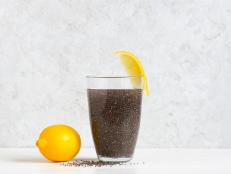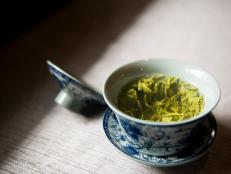Do Gut-Health Beverages Work?
From kombucha to probiotic sodas, there are plenty of products on the market that claim to benefit your gut. We asked gastrointestinal experts whether these drinks are worth sipping on.

Stefania Pelfini, La Waziya Photography/Getty Images
If you pass the beverage shelf, you’ll see many types of beverages touting gut health benefits. Between sodas, kombucha and more, there are plenty of beverages that tout “good-for-your-gut” labels. But is there legitimacy to these claims? We asked three gastrointestinal (G.I.) experts for their take on these allegedly gut-friendly drinks. Here’s what they had to say, and which ones they do recommend for gut health.
Do Gut Health Drinks Actually Work?
With so many beverages claiming to have gut health benefits, Beth Rosen, MS, RD, CDN, owner of Beth Rosen Nutrition, a virtual nutrition practice focused on gastrointestinal health and disordered eating from a weight-inclusive approach, says, “There is some legitimacy to some of them.” Rosen explains that “the inclusion of prebiotic fiber in beverages can help to grow and maintain a diversified microbiome, but some prebiotic fiber can cause G.I. symptoms.” In addition, Rosen explains that some beverages may contain probiotics, but not all are created equal as some die off between production and consumption, and some may need another probiotic, or need a metabolite of another probiotic strain, to function. “To date, we just don't have all the information to make definitive recommendations. Like bodies, all microbiomes are unique, so what works for one person may not work for everyone.”
In addition, Sarah Schlichter, MPH, RDN, creator of Bucket List Tummy and Nutrition for Running reminds us that “unlike probiotic supplements, many probiotic drinks also contain other nutrients, like protein, calcium and vitamin D.” Schlichter provides the example of kefir, a fermented milk and yogurt drink, has been shown to offer significant modulatory effects on the gut microbiota and mycobiota. In addition, not all of these gut health beverages and products are regulated by the FDA and direct evidence supporting the benefit for human health in some is lacking. “Another thing to consider is that many of these drinks can be more expensive than just getting probiotics through natural probiotic foods, like yogurt, kimchi, miso, sauerkraut and fermented soy products.
What Should You Look for in a Gut Health Beverage?
Rosen says that if you are focusing on prebiotics for gut health, then the main ingredient you want to look for is fiber. Some of the types of fiber you may see include guar gum or partially hydrolyzed guar gum, acacia fiber, psyllium, fiber inulin and chicory root fiber. Other sources of fiber include fruit, vegetables, whole grains, nuts, seeds, beans and legumes.
If you are focusing on probiotics, then look for live, active cultures, which means they were live and active at the time of packaging, like kefir.
Rosen also lists products that should be avoided, including those that have been shown in research to negatively impact the gut microbiome. “These include artificial sweeteners like saccharin and sucralose, certain gums like carrageenan (not all gums fall into this category, in fact some have prebiotic benefits such as guar gum), and some emulsifiers like polysorbate-80 and carboxymethyl cellulose.”
Schlichter also chimes in and says that some health drinks like kombucha include different teas like black tea or green tea. If you are sensitive to caffeine, you may want to take this into consideration. In addition, some of these beverages can have high amounts of added sugars, which can add up quickly if you are drinking more than one serving or a whole bottle’s worth. “Other ingredients to take note of are sodium, preservatives, artificial flavors and artificial sweeteners, which may lead to more gastrointestinal discomfort in some people.”
Dr. Renee Korczak Ph.D.RDN, CSSD, LD of Premier Nutrition Consulting Services says that “not all gut health beverages are created equal.” She provides the following checklist to determine whether a beverage is legitimate:
- Types of Ingredients: Do they contain gut-friendly ingredients like prebiotic fiber, fiber or probiotics?
- Package Claims: Korczak recommends asking yourself if the claims sound truthful or seem misleading.
- Brand Credibility: Check the brand’s website and look at its science. See if its formulas are based on science with ingredients that are well established and backed by research.
If you’re unsure, you can always ask your registered dietitian nutritionist (RDN).
Can You Overdo Gut Health Drinks?
As the saying goes, everything in moderation. And yes, this applies to gut health drinks, too. Rosen explains, “For some people, there is a level of intolerance that can lead to gastrointestinal symptoms such as bloating, gas and diarrhea, as for those with Irritable Bowel Syndrome, but for people without gastrointestinal health issues there does not seem to be any level of toxicity associated with these beverages.” Rosen warns, however, that more isn’t better with gut health beverages “as taking in a lot of one probiotic strain may create an imbalance with other strains, and having more prebiotic fiber may not be necessary to provide nourishment to our microbes.”
When trying a new gut health beverage, Korczak recommends seeing how you tolerate it. “Beverages that contain ‘gut friendly’ ingredients such as fiber may cause a temporary increase in occasional gas or bloating, but you should know that this is completely normal as your body is adapting particularly to fiber. If you are uncertain about how you are reacting to a new beverage that you've recently incorporated into your diet, it is important to check with a registered dietitian or another healthcare provider.”

NataliPopova/Getty Images
Expert-Recommended Gut-Health Drinks
Kefir: This fermented yogurt drink contains live bacterial cultures and yeast. Store-bought kefir may contain additional probiotic and prebiotic ingredients. “I recommend this because besides being good for gut health, it contains protein and carbohydrates which offer additional benefits to the body like energy and muscle-building compounds,” explains Rosen. Schlichter adds that kefir is 99 percent lactose-free and as a fermented yogurt, it offers protein, calcium and vitamin D without artificial sweeteners and preservatives (specifically plain kefir).
Smoothies: “Smoothies are a great way to incorporate fruits and vegetables to reap the benefits from fiber without any unnecessary ingredients,” says Rosen. You can choose the fruits and vegetables and mix it with milk, a plant-based beverage or water to help up your fiber. Rosen also recommends adding oats to get some beta-glucan, which is a soluble fiber that supports gut health and digestion.
Water: Rosen reminds us that “gut health doesn’t always have to come in the form of a packaged powder or beverage; water is a great drink to improve gut health.” Being hydrated improves digestion and aids in gut motility and stool formation.
GT’s Trilogy Kombucha: Schlichter recommends this refreshing and flavorful bubbly drink without added sugars. It includes kiwi, lemon and raspberry juice to add sweetness. One bottle contains 50 calories with 12 grams of carbs (10 grams of natural sugars).
Culture Pop Soda: For folks who want a low-calorie option without added sugars or artificial sweeteners, Schlichter recommends Culture Pop Soda which is sweetened with herbs and juice blends.
Kevita: This probiotic sparkling beverage is also on Schlichter’s recommendation list as it has a kefir culture but keeps the drink light, with a fun blend of bold, spicy and fruit flavors like in its lemon-cayenne flavor.
Olipop: The last of Schlichter’s recommendations is a fun brand built around capturing the prebiotics to help probiotics flourish. It does have high fiber content, so this is great for those looking for a healthier alternative to soda. Each can provides nine grams of fiber, which is 32 percent of the daily recommended amount.
Related Content:


































